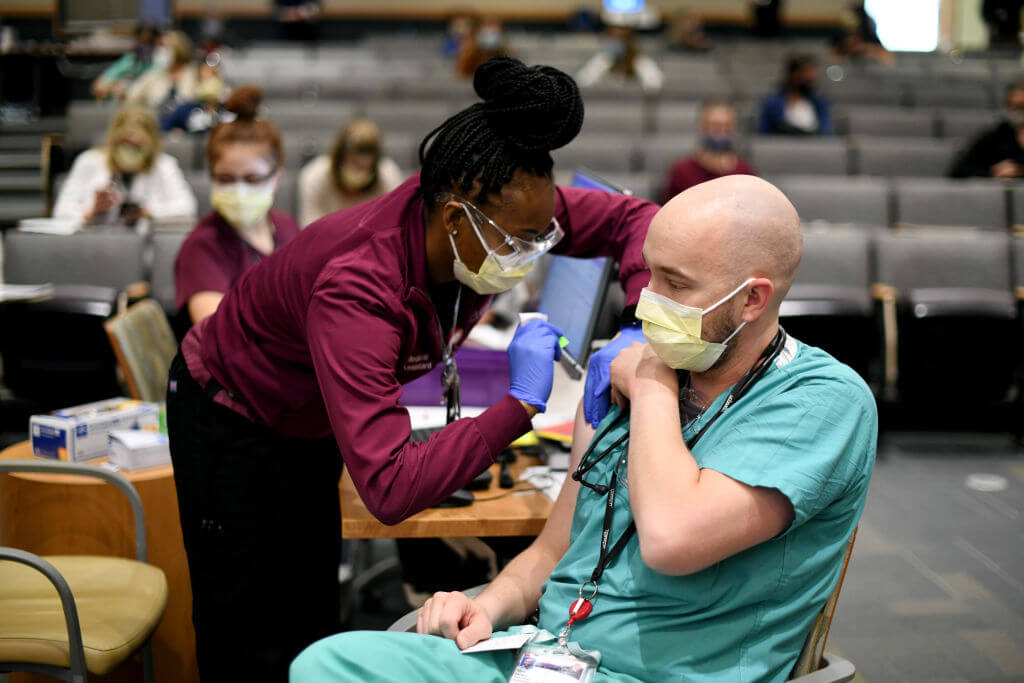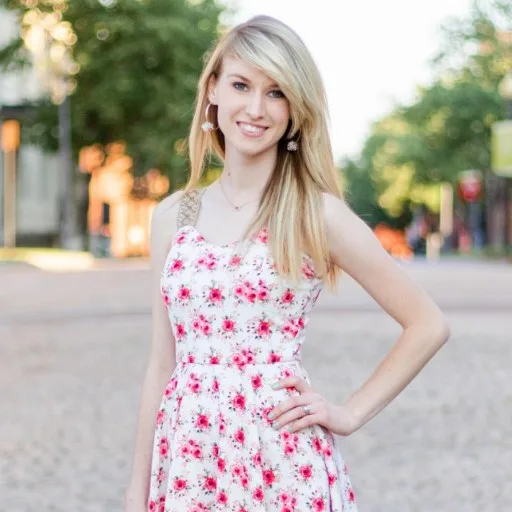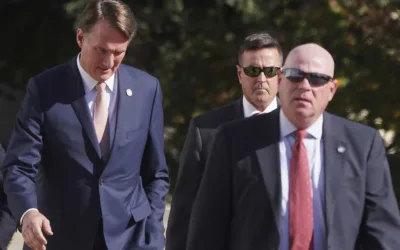
Medical assistant Shalice Wheeler, left, administers Covid-19 vaccine to physician assistant Matt Ferraro. (Photo by Hyoung Chang/MediaNews Group via Getty Images)
Virginia received $38.5 million for vaccine efforts.
HAMPTON – Virginia will get $38.5 million in federal funds to help vaccinate people. More specifically, the majority of the money will go toward expanding the state’s mobile vaccine unit. But what does that mean?
The money came in the form of two grants. One amounted to $36.7 million and the other slid in at $1.8 million. The Federal Emergency Management Agency (FEMA) gave the money to the Virginia Department of Emergency Management (VDEM).
“Getting shots into arms is what will end this pandemic,” said Virginia Senators Mark Warner and Tim Kaine in a joint statement sent to the press. “That is why we’re glad to see these federal dollars will provide support for vaccination efforts throughout the Commonwealth, and we remain committed to ensuring that every Virginian has the opportunity to get vaccinated as quickly as possible.”
Lauren Opett works as the director of communications and serves as the chief agency spokesperson for the VDEM. She helped break down the numbers, explaining the intended uses for the two grants.
Mobile Vaccination Sites in Virginia
The grant of $36,750,003.75 will establish a number of traveling vaccine opportunities across the Commonwealth. The money allows the VDEM to enter into contracts for mobile vaccination sites in the state’s most vulnerable population areas.
“The VEST Unified Command is focused on COVID-19 impacts to marginalized and underserved populations,” Opett said. “Some of the individuals in these populations do not have access to transportation, or may have access and functional needs. The fixed site vaccination operations will only benefit those who can get transportation there.”
As of Saturday, the VDEM did not release any specific information on which localities would receive a mobile vaccine unit.
“FEMA allows for the states to apply for expedited funding, for which VDEM applied for funding to support mobile vaccination units. These units will be targeted in the most vulnerable populations where transportation and access and functional needs exist. The location of these mobile sites have yet to be determined, as the initial focus is on standing up fixed community vaccination center sites,” Opett said. “The mobile site locations will be viewed through an equity lens, and agreed upon through the Virginia Department of Health [and] Virginia Department of Emergency Management COVID-19 Unified Command structure.”
Just because vaccines are on the road doesn’t mean they’ll roll into a person’s driveway. People will still travel short distances to get to the mobile site.
“The concept for mobile units would be to have a fixed location within a community for a period of time, and then be able to relocate to a different area of the community where there is a vaccination need,” Opett said.
Hampton University Rises to the Challenge
Prior to the $38.5 million in FEMA funds, one Virginia university took COVID-19 vaccinations into their own hands.
Hampton University, founded in 1868, rose to the challenge to help struggling Virginians access the coveted vaccine. Last month, the school announced a mobile vaccine unit. The converted RV will take its inaugural trip to Surry County on April 10. There, it will test people for and vaccinate them against COVID-19.
“[University President Dr. William Harvey] really has a heart for people in the community and he wants to ensure that we can reach those who can’t necessarily come to us, the underserved,” said Dr. Michelle Penn-Marshall, university vice president for research. “…We decided to do that, honestly, so we could reach people who could not come to a convocation center or healthcare clinic or doctor’s office. We’ve designed it so that it had a laboratory in it. It also has an educational component – it has a television inside, a television on the outside – because we want to, beyond the pandemic as serious as this has been, we want to be able to continue to provide health education and healthcare to our local community members in the state of the Commonwealth of Virginia.”
Mobile unit drivers underwent training on Monday. They familiarized themselves with the generator, cold and ultra-cold storage compartments and other aspects of the RV.
“You really have to know what you’re doing besides just driving,” Penn-Marshall said. “It’s got a lot of technical parts to it.”
When the unit rolls down the road next month, it will visit areas with underserved or hesitant populations.
While the university sourced its own funds for the mobile unit, soon other parts of Virginia will have a similar offering thanks to the $38.5 million grant.
Staffing Needs in Virginia
The VDEM planned to utilize $1,814,688.83 of the grant to pay for staff needed to administer vaccines.
Specifically, the $1.8 million will help fund the Virginia Emergency Support Team’s (VEST) vaccination efforts at the Virginia Emergency Operations Center and VDEM regional offices. That amount also includes additional staff for public information and messaging.
Local governments will not receive a portion of the $1.8 million for vaccination staffing efforts.
Amie Knowles reports for Dogwood. You can reach her at [email protected]
JOIN THE CONVERSATION: Sign Up For Dogwood’s Newsletter
Support Our Cause
Thank you for taking the time to read our work. Before you go, we hope you'll consider supporting our values-driven journalism, which has always strived to make clear what's really at stake for Virginians and our future.
Since day one, our goal here at Dogwood has always been to empower people across the commonwealth with fact-based news and information. We believe that when people are armed with knowledge about what's happening in their local, state, and federal governments—including who is working on their behalf and who is actively trying to block efforts aimed at improving the daily lives of Virginia families—they will be inspired to become civically engaged.


VIDEO: Your support matters!
Your support matters! Donate today. @vadogwoodnews Your support matters! Visit our link in bio to donate today. #virginianews #virginia #community...

Op-Ed: Virginia’s new Democratic majorities pass key bills to improve your lives, but will Youngkin sign them?
The 2024 Virginia General Assembly regular session has wrapped up. It was a peculiar session from the outset, with Democratic majorities in the...

Op-Ed: Why Virginia Needs A Constitutional Amendment Protecting Reproductive Freedom
Virginia’s recent election season in 2023 drew in eyes from all over the country. Reproductive freedom was on the line and Virginia remained the...

From the state rock to the state flower, here’s how Virginia got its symbols
Have you ever wondered why the Dogwood is the state flower? Or how the cardinal became the state bird? We’re here to answer those questions and more...

VIDEO: Second-gentleman Douglas Emhoff gives speech on reproductive freedom
Second gentleman, Douglas Emhoff touched on reproductive freedom not only being a woman's issue but "an everyone's issue" during the Biden-Harris...

Glenn Youngkin and the terrible, horrible, no good, very bad night
Election Day 2023 has come and gone, and while there are votes to be counted, one thing is perfectly clear: Virginians unequivocally rejected Gov....





